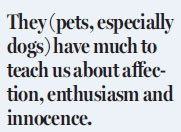It's a dog's life in Hong Kong
Updated: 2017-10-03 07:43
By Peter Mann(HK Edition)
|
|||||||
On Sept 26, World Dog Alliance hosted a "926" Dog Lovers' Day - 926 in Cantonese sounds like "dogs are easily happy". WDA is a local organization which campaigns against dog abuse and promotes legislation to ban the eating of dog meat. It is estimated that 30 million dogs are slaughtered every year for their meat, mainly in Asia, and that 70 percent of these are stolen pets. WDA says that dogs are special animals, and often family members and soul mates.
When I first came to Hong Kong in the 1970s, it was mainly foreigners who kept pet dogs. Now, any remotely middle-class residential area is full of owners (or helpers) walking their dogs. Why have dogs become so popular in this city obsessed with making money?
All pets, but especially dogs, provide excellent company. It is for good reason that they are known as "man's best friend". Dogs are always pleased to see you, are non-judgemental, give unconditional love and for old or childless couples are a substitute for children to shower love and attention on. As Hong Kong now has one of the lowest birth rates in the world it is not surprising that dog ownership has surged. Dogs are also fiercely loyal to their owners and can protect the home from burglars and unwelcome visitors. Their work with the police, customs, shepherds and blind people is well-known and irreplaceable. Maybe another reason is that dogs have become fashionable, even as status symbols with some rare breeds costing hundreds of thousands of yuan on the Chinese mainland.
A few years ago, I remember seeing a wonderful cartoon where God is sitting on a big cloud looking down at the Earth and says to a nearby angel, "I would have ended it all years ago if it hadn't been for dogs!" They are indeed wonderful creatures. Descended from a species of Mongolian wolf, they developed a friendship with mankind to aid their survival and have been liberally interbred for the last few thousand years to provide a rich variety of types.
Another interesting thing about dogs is that research has shown that the release of the "love hormone" oxytocin floods the bodies of both humans and dogs when they look into each other's eyes, similar to when mothers look at their babies. Over the last 10,000 years, dogs have developed this ancient function and it may explain the close relationship that humans have with their pets.

Technically, if you live in public housing (and some private housing) you are not allowed to keep pets. I suppose a blind eye is sometimes turned in the case of the elderly and singletons who have no other form of company. Pets, especially dogs, are known to provide excellent relief from the stress of our daily lives and are increasingly encouraged to visit old people's homes locally and hospitals overseas in recognition of the psychological benefits they bring.
They are also hugely popular with children. They have much to teach us about affection, enthusiasm and innocence.
The reason I mention that most pets are in middle-class areas, apart from the restrictions imposed by public housing, is that keeping a pet can be very expensive. Aside from pet food and accessories, anyone who has taken a sick pet to the veterinary clinic in Hong Kong will be aware of the eye-watering size of the bills, comparable to human treatment in private hospitals. Most of the vets are trained in Australia or South Africa and I wonder when our own universities will introduce veterinary courses. It is certainly good business!
As a dog owner and Buddhist, I have recently had an eye-opening experience. In the West, when a pet is old or sick it is common to take them to the vet to have them put down. Under Buddhist rules, no killing is allowed and euthanasia is therefore not permissible. When people say it is in the animal's best interest to be put down, assuming they are not in chronic pain, what they really mean is that it is in the owner's best interest. Looking after an old or sick animal is time-consuming and difficult. Most people don't have the time or patience to do so, unless they have a lot of compassion or a kind helper.
One bizarre anti-dog manifestation in Hong Kong is the case of the Bowen Road dog poisoner, the nemesis of local dogs, who lays poisoned meat in the area and has been responsible for the death of hundreds of dogs. Despite action by the police and vigilante groups, and the offer of substantial financial rewards, this wicked person has never been caught. Presumably, this person is offended by the sight of dog waste on the pavement. This is a reminder that dog ownership has its responsibilities, such as keeping dogs on leashes (and muzzles on larger dogs) and cleaning up after them.
At the end of the day, it is said that a dog is the only thing on earth that loves you more than it loves itself, but don't accept your dog's admiration as evidence that you are wonderful!
The author is a retired Hong Kong civil servant and dog lover.
(HK Edition 10/03/2017 page5)